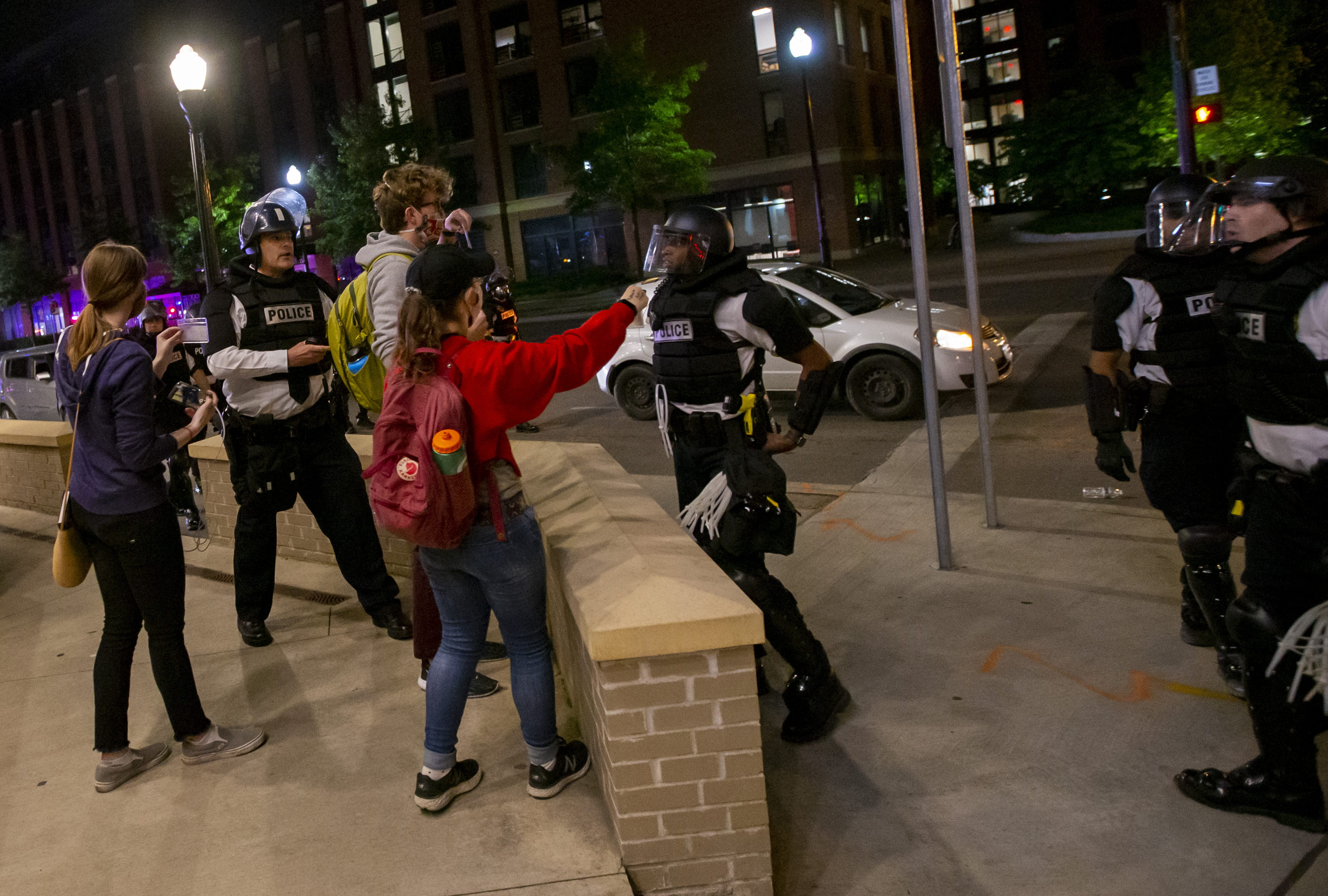
Three Lantern journalists clearly display their press credentials to Columbus Police June 1. They were pepper-sprayed by police after clearly stating that new media are exempt from the citywide curfew. Credit: Adam Cairns/The Columbus Dispatch
Lawyers representing five Columbus police officers filed a complaint Friday alleging the subpoenas directly related to May 29, May 30 and June 1 police conduct during Black Lives Matter protests — including the June 1 pepper-spraying of Lantern staff — were unconstitutional and in violation of federal case law and Ohio rules for criminal procedure.
In response to complaints over police misconduct, the city hired retired FBI agent Richard Wozniak to investigate potential criminal acts committed during the summer protests. Kathleen Garber, a special prosecutor within the City Attorney’s office, was also hired to prosecute any members of Columbus Police who Wozniak believed committed criminal acts.
The complaint was voluntarily dismissed by plaintiffs Monday, according to court documents.
The complaint — which was filed on behalf of police Lt. Lowell Rector, police Sgts. Caroline Castro and Justin Coleman and Officers Rufus Goodwin and Shannon Schmid — argues the subpoenas violate the “Home Rule” amendment of the Ohio Constitution, which states that municipalities can exercise the power to self-govern and enforce laws as long as it doesn’t violate state law. The complaint also says the city ordinance that allows for subpoenas to be issued for misdemeanors violates an Ohio law that only allows subpoenas to be issued for felony offenses.
The complaint cites the Ohio Constitution’s rule that subpoenas can be used during investigation of a crime only in the context of compelling a witness to testify before a grand jury. The complaint claims that local law — which allows for a subpoena to be issued for investigations — is unconstitutional.
Lawyers representing the officers did not immediately respond to requests for comment.
Garber said in a statement that she attempted to use investigative subpoenas to find out the identities of the officers in questions and that this is authorized in city code. However, she discovered there are limitations in the law pertaining to the statutory conduct of the municipal court.
Because of this, Garber said she withdrew the subpoenas Friday.
“As the independent prosecutor, I have a duty to exhaust all potential avenues to conclude our investigation. We’re in the final stages of this effort, and the independent investigator and I believe that criminal conduct occurred, but in some situations we cannot identify the officers engaging in that conduct due to the gear they were wearing at the time,” Garber said.
According to a provision in the collective bargaining agreement between the city and the police union that has been included since 1991, officers cannot be forced to submit to questioning, but the 1994 city ordinance that allows for investigative subpoenas damages that agreement and is also unconstitutional, the complaint claims.
Wozniak served an investigative subpoena to Goodwin March 4, which required him to appear before the Franklin County Municipal Court Tuesday to answer questions about the alleged assault on three reporters from The Lantern June 1. Goodwin was also given the option to supply the requested information outside of court at an alternative meeting of parties.
After using force, police policies generally require officers to report the incident to their supervisor. A supervisor may then conduct an administrative investigation, including questioning the officer, to determine if the use of force was appropriate. The officer must comply with this investigation or face insubordination, but the officer’s testimony cannot be used against them criminally under law, according to the complaint.
Protests over the death of George Floyd in Minneapolis police custody began in Columbus on May 28, 2020 and lasted more than one week. The protests saw police and protesters exchange projectiles and hostilities and, according to the complaint, saw $3.3 million worth of property damage.
The subpoenas were directly related to incidents that occurred May 29 at Broad and High streets, May 30 at the intersection of East Broad Street and North Grant Avenue — as well as near West Broad Street and Marconi Boulevard — and the June 1 pepper-spraying of Lantern staff at the intersection of Lane Avenue and North High Street.
No charges have been filed against any Columbus police officers.
This story was updated March 24 at 12:44 p.m. to include Garber’s statement.
This story was updated at 12:35 p.m. with information that the complaint was dismissed.
Correction: A previous version of this article incorrectly identified Wozniak as director of public safety for Columbus. The story has been corrected.


